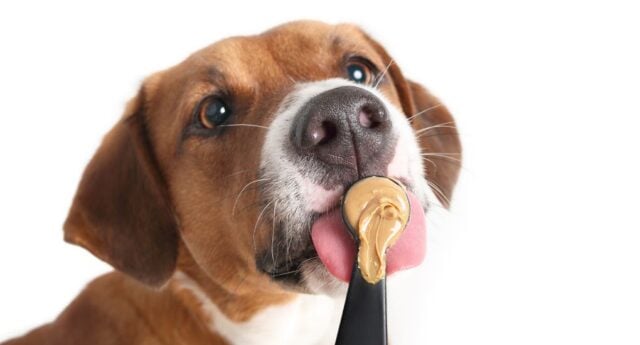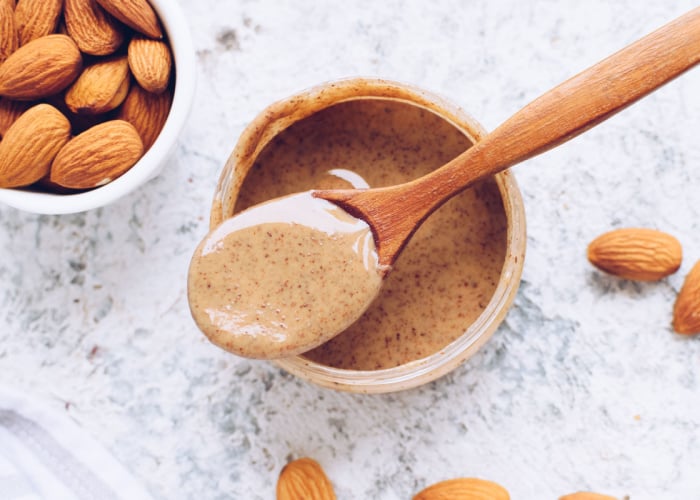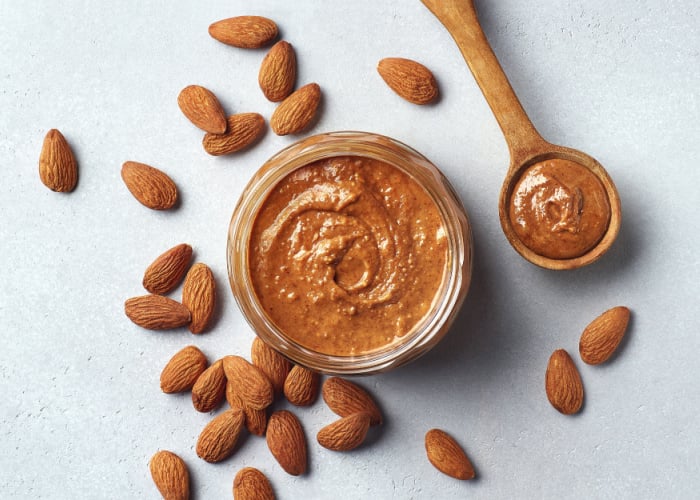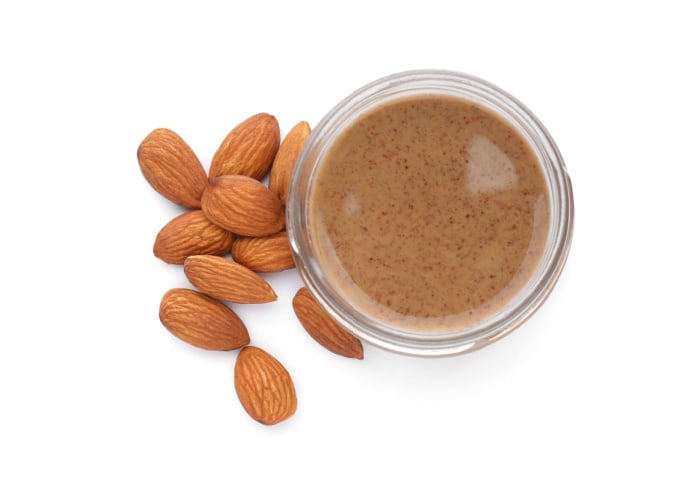
Table of Contents
Almond butter is a delicious snack for us humans. But can dogs eat almond butter, too?
Almond butter can be a great combination with toast, baked potatoes, and various meats and vegetables.
It has also gained popularity over the years because it's a great alternative to dairy for vegans and lactose-intolerant people.
Nowadays, many people are replacing peanut butter with almond butter since it slightly offers more nutritional value.
It's still a calorific food, but at least it has lower fat and more fiber than your good ol' peanut butter.
So, if you love to share peanut butter with your pup or feed it to him as a trick to take medication, you might wonder if dogs can safely eat almond butter.
The short answer is yes, our dogs can eat almond butter.
However, just like other human food, there are still things to consider before allowing your dog to eat a spoonful of this nutty goodness.
This blog will discuss everything you need to know about dogs and almond butter.
Below, we'll talk about the benefits and possible risks of almond butter to dogs and some tips on how to safely and properly give this treat to your pet.
But before that, let's first tackle what almond butter is.

What is almond butter?
The almond nuts we know are actually the seed of the almond tree Prunus dulcis.
An Almond butter, therefore, is almonds ground into a paste. It can be chunky or smooth, depending on how long the grinding lasts.
Now, going back to the almond nut itself.
The American Kennel Club listed almonds as not suitable for dogs.
Don't be confused; it's not toxic like macadamia and other nuts, but it still has health risks to pups.
Our dogs have difficulty digesting almonds. It is also fatty and a choking hazard as it is.
And remember, many differences exist between a human's digestive system and a dog's.
Mitch, I'm confused. If my dog can't eat almonds, why should I let him eat almond butter, then?
Well, almonds are still chock-full of nutrients our pups can benefit from!
They're great sources of vitamins B3 and E, calcium, antioxidants, magnesium, and much more that can help boost your dog's immune system.
These vitamins and minerals are also found in an almond's paste form, almond butter.
Sure, it's still fatty, but at least it's not a choking hazard anymore, right?
Can dogs eat almond butter?
With our explanation above, almond butter is technically safe for dog consumption.
I said technically because it is only safe if it's just almond butter with no harmful additives for dogs.
Some brands contain extra ingredients like oil, salt, vanilla, and xylitol. They put xylitol to add more taste to the butter since almonds are one of the weakest-tasting nuts.
If you're a long-time pet owner and you've been reading our articles for a while, you know that xylitol is extremely bad for dogs. But we'll get into that later on.
Common almond butter uses pre-toasted almonds to give it more flavor. But if the label says it's raw almond butter, it means that the almonds weren't toasted beforehand.
Not that it makes a lot of difference in our dogs, so either should be just fine.
Dogs can enjoy an almond butter treat only occasionally.
Giving them this treat regularly will not only spoil your dog, but it might also cause intestinal distress when eaten in large amounts.
Also, avoid any flavored or sweetened almond butter. Check the ingredients list and ensure it has no salt, sweetener, or xylitol.
Choose a brand that only has ground raw or roasted almonds in the ingredients, with no additives included.
How much almond butter is safe for dogs?
As discussed earlier, dogs can enjoy almond butter as a safe treat, but only in moderation.
No matter how much they love and beg for this, your dog's health should be your priority.
Limit the amount of almond butter you feed your dog to avoid possible health problems.
Nut butter, like almond butter, is a high-fat food. That's why it will be difficult for Fido to digest it. And remember, their digestive system works differently than ours!
If you plan to give your pup almond butter, we recommend one tablespoon for large dogs, such as the Cane Corso, or one teaspoon for small dogs, like the Pomeranian.
And don't give it to them every day! About three times a week should be fine.
Remember: It's always best to err on the side of caution when it comes to our furry friends.

Benefits of almond butter to dogs
Many people are now choosing almond butter over peanut butter because it is healthier.
Now, dogs can also benefit from this tasty snack.
Almond butter is filled with magnesium and calcium, essential for maintaining bone health, muscle function, and heart health in dogs.
Almond butter also has vitamins B, E and other nutrients that dogs need. It also has antioxidant compounds such as flavonoids and polyphenols to support the dog's overall health.
The benefits that almond butter offers to dogs are:
- Vitamin E: Helps your dog's skin and coat, battles free radicals, and enhances the immune system.
- Vitamin B3: Helps inflammatory skin problems and supports the liver and eyes.
- Vitamin B6: Supports red blood cells.
- Antioxidants: Helps fight off inflammation.
- Calcium: Helps maintain bone strength and teeth.
- Magnesium: Helps absorb other nutrients and to maintain the immune system.
- Fatty acids: Reduces risks of cardiovascular disease.
- Fiber: Helps maintain a dog's healthy digestive system.
Risks of giving dogs almond butter
Almond butter also comes with risks when given to dogs, especially in excessive amounts or with unsafe ingredients mixed in.
Here are some risks pet owners like you should be aware of.
Xylitol Poisoning
Xylitol is a type of carbohydrate that does not contain alcohol. It's a low-calorie artificial sweetener that is highly poisonous for dogs.
This sweetener is a great ingredient many manufacturers use since its sweetness is similar to sugar but has fewer calories.
Because of this, a lot of health-conscious people prefer xylitol. However, even though it's safe for people, it can extremely harm dogs.
Generally, it takes 0.05 grams of xylitol for every pound of a dog's weight to cause negative effects.
A few symptoms of xylitol poisoning are:
- Vomiting
- Constipation
- Loss of appetite
- Pale gums
- Lethargy
- Seizures
- Tremors
- Liver damage
- Rapid heartbeat
- Incoordination
- Intestinal upset
Pancreatitis
Even if the almond butter doesn't have xylitol, there are still risks when you feed your dog excessively.
Since almond butter is high in fat, large amounts of this snack can cause pancreas inflammation or pancreatitis and an upset stomach.
Pancreatitis left unaddressed can be fatal. If your dog is suffering from pancreatitis, he may experience the following symptoms:
- Vomiting
- Fever
- Diarrhea
- Difficulty breathing
If you notice any of these symptoms that come on very quickly, head to the veterinary clinic immediately.
Weight Gain
Excessive almond butter feeding to dogs can also lead to weight gain.
Since all nuts are high in fat, overeating this snack may lead to obesity.
Obesity is a serious problem that can lead to several other health issues, such as diabetes.

Why can dogs eat nut butter but not nuts?
A dog's digestive system differs from humans; they can't process whole, raw nuts such as almonds, peanuts, or cashews.
Since nut butter is roasted and ground, it makes it easier to digest so dogs can process it.
While eating one or two won't necessarily harm your pup with a strong immune system, large amounts of whole nuts can be a choking hazard.
It can also cause vomiting, diarrhea, stomach upset, and lack of appetite in dogs.
Like nut butter, whole nuts can cause weight gain, obesity, and liver failure due to their high fat content.
Tips to safely add Almond Butter into your dog's diet
If you plan to feed Fido almond butter, here are a few tips to help ensure your giving is safe.
While it has several pet health benefits, pet owners should double-check and be cautious when introducing a new dog food or medication.
It's best to consult your vet to ensure your giving is safe.
Check the ingredients carefully
When choosing almond butter, pet owners must check the ingredients and avoid artificial sweeteners.
Do not buy any pet almond butter or any nut butter that contains xylitol or other harmful additives.
Xylitol is a harmful sweetener that can fatally harm dogs.
Keep portions small
Almond butter should only be an occasional dog treat. Even if it can be nutritious to dogs, it is still high in fat and can cause stomach upset.
Excessive amounts of almond butter can also lead to gastrointestinal problems, weight gain, obesity, and more.
Find simple recipes or make your own almond butter
If you feel anxious or scared, you can always try to make tasty treats yourself.
If you mix it into homemade dog treats or dog foods, look for almond butter with no added sugars, salts, or other preservatives.
Here's a quick example of a delicious recipe for almond oatmeal cookies:
Homemade Almond Oatmeal Cookies Recipe
Ingredients:
- 1 cup of rice flour
- ½ cup of oatmeal
- ½ cup of almond butter
- Two eggs
- 2 tbsp. water
Directions:
- Preheat oven to 350˚.
- Mix rice flour, oatmeal, almond butter, and eggs (with shells) in a bowl.
- Slowly stir in water.
- Roll out dough ¼ inch thick and shape as desired.
- Bake for 12 minutes.
- Cool and serve.
Leftovers can be stored in the refrigerator for five days and in the freezer for up to 3 months.
And instead of buying almond butter from the grocery, you can also make your own almond butter!
With this process, you have complete control.
Make it free from sugar, sweeteners, and preservatives that can cause an upset stomach in dogs.
Watch out for dog allergies
It's important to talk to your vet first before giving them new food for the first time. Your vet can help you test your pup for allergies.
Some dogs can have an allergic reaction to almond butter.
Dogs can also be allergic to beef, dairy, wheat, eggs, chicken, lamb, or soy.

Frequently Asked Questions
Which is healthier: peanut butter or almond butter?
Both nut butter have similar nutritional value, but almond butter is slightly healthier than peanut butter since it has more vitamins, minerals, and fiber.
However, both nuts roughly have equal calories and sugar.
Which nut butter is best for dogs?
The safe ones for dogs are peanut butter, almond butter, cashew butter, or hazelnut butter.
But be cautious because these are still high in calories and should only be given as an occasional treat.
The ones you should avoid for your dog at all costs are pistachio butter, pecan butter, walnut butter, and butter made with macadamia nuts.
These can cause harmful side effects that are extremely bad for dogs.
Does Skippy have xylitol?
Skippy Peanut butter is xylitol-free and is safe for dogs. However, Skippy contains ingredients like sugar, hydrogenated vegetable oil to prevent separation, and salt.
That's why even if Skippy is safe for dogs, it's not the healthiest treat.
Can Dogs Eat Almond Butter: Before You Go…
So, can dogs eat almond butter? Yes! Fido can enjoy the occasional treat of almond butter.
However, pet owners should still be cautious and consult with their vets first.
Not all canines can digest nuts easily, especially almonds. Most have difficulty processing almonds. It is also fatty and a choking hazard for dogs.
That said, they should only be given almond butter in small amounts.
It's fatty, yes, but it's still filled with vitamins and nutrients that can help maintain your dog's health.
So, if you plan to give your pup this treat, limit your dog's intake.
But before that, you should also ensure that the product you're getting is xylitol-free and no additives can harm your pup.
Now that we have that clear, do you want to read more articles about what dogs can and can't eat?
Check out our recommended articles below, then!












